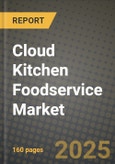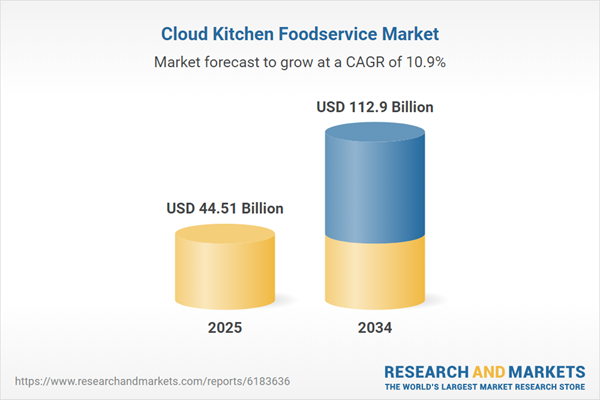Cloud Kitchen Foodservice Market
The cloud kitchen market consists of food‑service operations that prepare meals exclusively for online ordering and delivery (and sometimes collection) without a traditional dine‑in front‑end. These kitchens may serve one brand or multiple virtual brands from a shared facility, and they are increasingly integrated with food‑delivery platforms, mobile ordering apps and digital fulfilment ecosystems. Applications span meal‑delivery for consumers, corporate catering, quick‑service restaurants experimenting with delivery‑only channels, and QSR/food‑tech start‑ups launching with minimal real‑estate footprint. Key trends include escalating digital‑ordering volumes, urbanisation and rapid growth of food‑delivery platforms, cost‑efficiencies from eliminating front‑of‑house and real‑estate costs, and proliferation of multi‑brand kitchens operating from one facility. Major drivers are changing consumer behaviour (preference for convenience, ‘food‑on‑demand’), growth of single‑person or dual‑income households, increasing smartphone & app penetration, and the food‑service sector’s push to deploy delivery‑first models. On the supply side, the competitive landscape includes legacy restaurant chains converting or adding cloud‑kitchen formats, dedicated cloud‑kitchen operators leasing facilities to brands, food‑tech platforms offering kitchen‑as‑a‑service, and aggregators expanding delivery‑only menus. Other dynamics include real‑estate optimisation (lower rent zones, micro‑warehouses), technology (kitchen‑management systems, order routing, data analytics), manpower/automation trade‑off, and regulatory issues (zoning, food‑safety compliance, hygiene). Overall, the cloud kitchen market is poised for strong growth as the food‑service industry shifts increasingly toward delivery‑centric models - but the path to profitability, differentiation and scale remains challenging.Cloud Kitchen Foodservice Market Key Insights
- Digital ordering and delivery growth are foundational - The surge in food delivery apps and consumer familiarity with mobile ordering has enabled cloud kitchens to scale rapidly by tapping delivery demand rather than footfall.
- Real estate and operational cost advantages confer competitive edge - Removing the dine in space, front of house cost and premium retail rent reduces overhead, enabling cloud kitchens to launch faster and optimise cost per order.
- Multi brand and shared kitchen models accelerate innovation and flexibility - Operators are running multiple virtual brands from one kitchen, allowing experimentation, rapid menu swaps and efficient use of space and labour.
- Emerging markets and urban centres offer fastest growth - Urbanisation, dual income households, high smartphone penetration and delivery app adoption in Asia Pacific, Latin America and Middle East drive uptake.
- Menu, cuisine diversity and customisation matter - Consumers expect variety (international cuisines, diet specific formats, micro brands) and cloud kitchens are well placed to test new menus or niche segments with lower risk.
- Technology and data analytics are differentiators - Successful cloud kitchen operators deploy kitchen management systems, order routing algorithms, demand forecasting, delivery time optimisation and packaging/fulfilment efficiency tools.
- Delivery cost and logistics remain major constraints - Even with kitchen cost savings, delivery partner commissions, last mile cost, packaging and maintaining food quality on route limit margins and present operational risk.
- Brand equity and customer experience still matter - While physical presence is absent, customers still care about food quality, reliability, packaging, delivery time and digital ordering experience - brand management is critical.
- Regulatory / zoning / hygiene oversight is evolving - The cloud kitchen model sometimes challenges existing food service regulations (zoning, licencing, food safety inspection), which may vary by region and slow rollout or scale up.
- Scale, profitability & consolidation are next phase challenges - Many operators are scaling rapidly but achieving sustainable profitability is still non trivial; scale economics, optimisation of kitchens, delivery cost control, and brand ecosystem development are key differentiators moving forward.
Cloud Kitchen Foodservice Market Reginal Analysis
North America
In North America, the cloud‑kitchen market is relatively mature among the delivery‑centric channels, supported by high smartphone/app penetration, well‑established food‑delivery infrastructure, and urban logistics networks. Growth is steady with operators focusing on scale‑efficiency, multi‑unit network roll‑outs and leveraging data to streamline delivery/fulfilment. Cost pressures (real‑estate, labour, delivery fees) and competition from incumbent QSR chains are moderating factors.Europe
Europe exhibits growing cloud‑kitchen adoption, particularly in major urban centres and for delivery‑only or hybrid models of existing brands. Regulatory frameworks (food‑safety, zoning), multi‑lingual/logistics complexity and higher cost base (labour, real‑estate) moderate adoption pace. Nonetheless, demand for convenience and delivery across major cities is fostering expansion.Asia‑Pacific
Asia‑Pacific is the fastest‑growing region for cloud kitchens. Rapid urbanisation, growth of food‑delivery platforms, younger demographics, high smartphone and app usage, and willingness to order food online support robust growth. Countries such as China, India, Southeast Asia are key hotspots, though infrastructural/logistical maturity and price sensitivity remain challenges.Middle East & Africa
In MEA, the cloud‑kitchen model is emerging strongly in urban hubs, where delivery demand is rising among young and affluent consumers. Large logistics/real‑estate cost advantages and less dine‑in competition make the model appealing. However, fragmented markets, regulatory variation, and supporting infrastructure (deliveries, packaging, cold‑chain) are still evolving.South & Central America
Latin America presents meaningful growth opportunities for cloud kitchens, with increasing delivery penetration and urbanised populations. Real‑estate cost pressures, informal delivery ecosystems, currency/economic volatility and consumer price sensitivity pose challenges, suggesting that cost‑efficient models and local‑cuisine brands may perform best.Cloud Kitchen Foodservice Market Segmentation
By Kitchen Type
- Independent Cloud Kitchen
- Commissary/Share Kitchen
- Kitchen Pods
By Nature
- Franchised
- Standalone
By Technology
- Point of Sale (POS)
- Reporting and Analytics
- Delivery Applications
- Inventory Management
- Kitchen Management
By Delivery
- Online Food Delivery
- Restaurant Direct
Key Market players
Rebel Foods, Kitopi, CloudKitchens, Kitchen United, DoorDash Kitchens, Zuul Kitchens, Taster, Deliveroo Editions, Keatz, Ghost Kitchen Brands, Nextbite, Dahmakan (Pop Meals), Foodpanda Kitchens, JustKitchen, Franklin JunctionCloud Kitchen Foodservice Market Analytics
The report employs rigorous tools, including Porter’s Five Forces, value chain mapping, and scenario-based modelling, to assess supply-demand dynamics. Cross-sector influences from parent, derived, and substitute markets are evaluated to identify risks and opportunities. Trade and pricing analytics provide an up-to-date view of international flows, including leading exporters, importers, and regional price trends.Macroeconomic indicators, policy frameworks such as carbon pricing and energy security strategies, and evolving consumer behaviour are considered in forecasting scenarios. Recent deal flows, partnerships, and technology innovations are incorporated to assess their impact on future market performance.
Cloud Kitchen Foodservice Market Competitive Intelligence
The competitive landscape is mapped through proprietary frameworks, profiling leading companies with details on business models, product portfolios, financial performance, and strategic initiatives. Key developments such as mergers & acquisitions, technology collaborations, investment inflows, and regional expansions are analyzed for their competitive impact. The report also identifies emerging players and innovative startups contributing to market disruption.Regional insights highlight the most promising investment destinations, regulatory landscapes, and evolving partnerships across energy and industrial corridors.
Countries Covered
- North America - Cloud Kitchen Foodservice market data and outlook to 2034
- United States
- Canada
- Mexico
- Europe - Cloud Kitchen Foodservice market data and outlook to 2034
- Germany
- United Kingdom
- France
- Italy
- Spain
- BeNeLux
- Russia
- Sweden
- Asia-Pacific - Cloud Kitchen Foodservice market data and outlook to 2034
- China
- Japan
- India
- South Korea
- Australia
- Indonesia
- Malaysia
- Vietnam
- Middle East and Africa - Cloud Kitchen Foodservice market data and outlook to 2034
- Saudi Arabia
- South Africa
- Iran
- UAE
- Egypt
- South and Central America - Cloud Kitchen Foodservice market data and outlook to 2034
- Brazil
- Argentina
- Chile
- Peru
Research Methodology
This study combines primary inputs from industry experts across the Cloud Kitchen Foodservice value chain with secondary data from associations, government publications, trade databases, and company disclosures. Proprietary modeling techniques, including data triangulation, statistical correlation, and scenario planning, are applied to deliver reliable market sizing and forecasting.Key Questions Addressed
- What is the current and forecast market size of the Cloud Kitchen Foodservice industry at global, regional, and country levels?
- Which types, applications, and technologies present the highest growth potential?
- How are supply chains adapting to geopolitical and economic shocks?
- What role do policy frameworks, trade flows, and sustainability targets play in shaping demand?
- Who are the leading players, and how are their strategies evolving in the face of global uncertainty?
- Which regional “hotspots” and customer segments will outpace the market, and what go-to-market and partnership models best support entry and expansion?
- Where are the most investable opportunities - across technology roadmaps, sustainability-linked innovation, and M&A - and what is the best segment to invest over the next 3-5 years?
Your Key Takeaways from the Cloud Kitchen Foodservice Market Report
- Global Cloud Kitchen Foodservice market size and growth projections (CAGR), 2024-2034
- Impact of Russia-Ukraine, Israel-Palestine, and Hamas conflicts on Cloud Kitchen Foodservice trade, costs, and supply chains
- Cloud Kitchen Foodservice market size, share, and outlook across 5 regions and 27 countries, 2023-2034
- Cloud Kitchen Foodservice market size, CAGR, and market share of key products, applications, and end-user verticals, 2023-2034
- Short- and long-term Cloud Kitchen Foodservice market trends, drivers, restraints, and opportunities
- Porter’s Five Forces analysis, technological developments, and Cloud Kitchen Foodservice supply chain analysis
- Cloud Kitchen Foodservice trade analysis, Cloud Kitchen Foodservice market price analysis, and Cloud Kitchen Foodservice supply/demand dynamics
- Profiles of 5 leading companies - overview, key strategies, financials, and products
- Latest Cloud Kitchen Foodservice market news and developments
Additional Support
With the purchase of this report, you will receive:- An updated PDF report and an MS Excel data workbook containing all market tables and figures for easy analysis.
- 7-day post-sale analyst support for clarifications and in-scope supplementary data, ensuring the deliverable aligns precisely with your requirements.
- Complimentary report update to incorporate the latest available data and the impact of recent market developments.
This product will be delivered within 1-3 business days.
Table of Contents
Companies Mentioned
- Rebel Foods
- Kitopi
- CloudKitchens
- Kitchen United
- DoorDash Kitchens
- Zuul Kitchens
- Taster
- Deliveroo Editions
- Keatz
- Ghost Kitchen Brands
- Nextbite
- Dahmakan (Pop Meals)
- Foodpanda Kitchens
- JustKitchen
- Franklin Junction
Table Information
| Report Attribute | Details |
|---|---|
| No. of Pages | 160 |
| Published | November 2025 |
| Forecast Period | 2025 - 2034 |
| Estimated Market Value ( USD | $ 44.51 Billion |
| Forecasted Market Value ( USD | $ 112.9 Billion |
| Compound Annual Growth Rate | 10.9% |
| Regions Covered | Global |
| No. of Companies Mentioned | 15 |









